One of the questions at the top of everyone’s mind is will vaccination prevent COVID-19 in patients with chronic lymphocytic leukemia (CLL)? It has been a difficult question to answer since all CLL patients are immunocompromised. This means that their immune systems are weakened to varying degrees, which can increase susceptibility to infections. Some of the questions researchers are trying to answer include:
- Do vaccines work in untreated patients with CLL?
- Do vaccines work in patients who are currently on or previously received treatment?
- How do different CLL treatments affect vaccine response?
At the annual meeting of the American Society of Hematology (ASH) 2020, our own Dr. Brian Koffman interviewed Dr. Lindsey Roeker, a hematologic oncologist at Memorial Sloan Kettering Cancer Center. They discussed new data looking at COVID-19 vaccine response in patients with CLL.
Takeaways:
- A previous study from Israel had disappointing results with only 40% of 167 CLL patients producing antibodies in response to the COVID-19 vaccine. This showed that vaccine response is impaired in patients with CLL.
- This new data from Dr. Roeker and colleagues provide additional information from a group of 44 patients with CLL who received two doses for either the Pfizer or Moderna COVID-19 vaccines.
- Antibodies were checked at least 2 weeks after receiving the second dose of the vaccine.
- 17 out of 18 patients (94%) who had never been treated for CLL formed antibodies.
- Only 6 out of 26 patients (23%) who had previously received treatment for CLL formed antibodies.
- Patients who were currently on a BTK inhibitor were much less likely to produce antibodies.
- Patients who had been treated with an anti-CD20 monoclonal antibody within the past year were much less likely to produce antibodies.
- None of the patients treated with venetoclax + an anti-CD20 monoclonal antibody within the past year formed antibodies.
- Patients who were less than 70 years of age were more likely to form antibodies.
- Patients with CLL should still exercise caution including avoiding contact with people that are sick, wearing a mask in crowded situations, and washing hands.
- While antibody response is important, it is not the only part of the immune response. T cells also play an important role because they seek out and destroy cells that are already infected with the virus.
- In theory, T cells could help provide some protection against COVID-19 by clearing out the infection and reducing the severity of the disease, and scientists are working to figure out whether T cells actually do have protective effects.
- As more people are vaccinated, the risk of infection goes down for everyone.
Conclusions:
We know it has been a hard year, and patients are anxious to hug their loved ones again. While these findings are disappointing, they are not the end of the story. Researchers are working hard to answer questions about vaccine response in patients with CLL and other immunocompromised conditions. Given the uncertainties, we recommend that CLL patients, even when vaccinated, still adhere to the three tried and true mandates for COVID-19 safety which are to maintain social distancing, handwashing, and wear a well-fitted face mask.
Please enjoy this brief interview with Dr. Roeker from the virtual ASH meeting which was held in December, 2020.
You can read the actual paper here: COVID-19 vaccine efficacy in patients with chronic lymphocytic leukemia
Take care of yourself first.
Ann Liu, PhD



